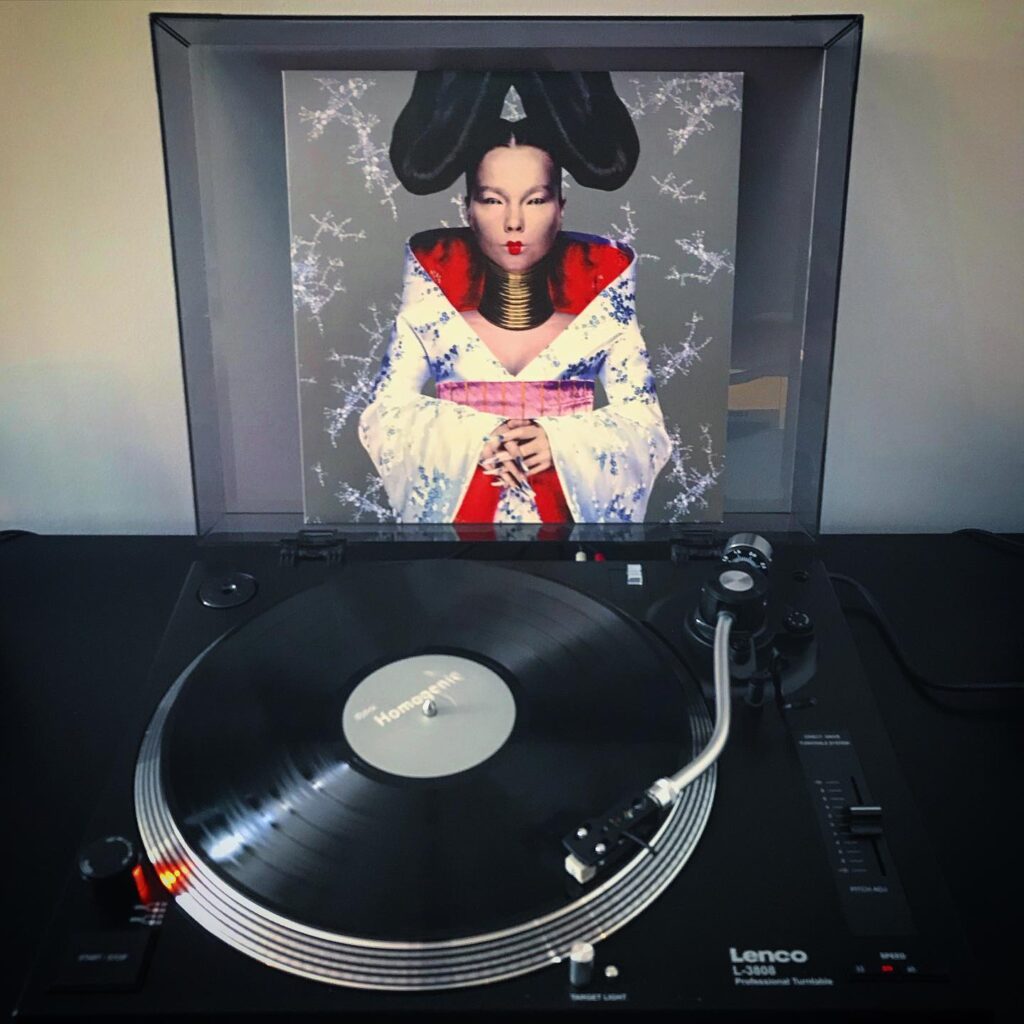VINYLLY :: Part Six
Though I can appreciate the difference between guileless patriotism and malevolent nationalism in most examples, the wearying frequency with which the former is co-opted and subsumed by the latter is always heartbreaking to see, especially given how prevalent this tactic has been in present-day politics where leaders desperate to cling to power recklessly use fearmongering to maintain their grasp.
The reason I bring this up is because it is one of the first things that pops into my head when I think about this (last) year’s (belated) UEFA European Football Championship and the thrall it has continued to hold over England in particular as its national team ascends further towards the grand final. Granted, most of this fervour has been dictated by a media keen to quash reports of a third wave of COVID infections currently rampaging its way through the populace as the government all-too-excitedly moves to wash its hands of all responsibility by lifting social distancing restrictions entirely on July 19th, but as ever, the football tournament has instilled a naïve optimism that has temporarily nulled the everyday pain of “unprecedented life” with something actually resembling an esteemable sense of national pride. How bittersweet that team manager Gareth Southgate and his squad of bright, young, future-forward-thinking things, taking knees, wearing rainbow armbands and generally bettering the game by acknowledging its problematic fanbase as they look towards something more inclusive and celebratory, have done more for England’s sense of self in a few weeks than the politicians in charge of running the country have done for the past two years blundering through one bad read of the pandemic data after another.
Let’s just hope when infection rates spike furthermore after their final match against Italy because some people despite everything still cannot help themselves that MP’s aren’t so quick to do another 180 and blame them for the rising infection rate, eh? Otherwise, well done lads; try not to let those bigots who call themselves “fans” bring you down…
On a lighter note and somewhat in tribute to the England ballfoot team providing the most recently sterling example of the present-day patriotism done right though, this latest dive into my fledgling record collection investigates the strides made by a certain iconoclast doing the very same thing with what is roundly considered by fans and even some detractors as her most pioneering success in terms of bridging the worlds of cutting-edge electronica and contemporary classical music for full-blown all-encompassing feels.
VINYLLY!!
#7: Homogenic – Björk (1997, Björk Overseas/One Little Independent, TPLP71)

Upon the eve of the release of her third English language solo album, Björk’s status as one of the world’s more prodigious singer/songwriters of the 1990s had reached stratospheric levels of recognition, with the one-two punch of 1993’s Debut and its 1995 follow-up Post, as well as their resultant singles and music videos, securing her place as a mainstay on MTV who provided a meeting point between alternative indie kids, hedonist dance heads and mainstream pop fans. However, with this new level of fame came a more intense scrutiny from the tabloid press, who were as keen to relegate the singer’s talents as being merely quirky and twee as they were prying into her private life. After a particularly chilling episode involving a psychotic fan, Björk finally retreated from public view to take some time away from her hectic promotional schedule, alternating between Iceland and Spain as she sketched out songs for her next collection which would be as much a physical return to her inspiring homeland as it would be an emotional and intellectual reconciliation of everything her life and career had embodied up until this point.
Björk has often described Homogenic as her first attempt at “modern Icelandic pop music”, remarking that after previously finding herself in something of an international hotbed of genres and styles both via Debut’s giddily cosy ensconcement within the London dance music scene as well as Post’s subsequent wander around the rest of the world, she felt compelled to create something that evoked what she felt it meant to be Icelandic. Producing much of the album herself with some invaluable help from techno music pioneer Mark Bell of LFO (no, not them), Björk commits to a specific modus operandi throughout Homogenic that specifically relates to Iceland’s geological landscape, the distorted electronic beats representing the volatile volcanicity of the earth whilst the string sections portray the ravishingly turbulent weather, her voice holding court all the while with typically clairvoyant authority. Björk renders Iceland’s raw geology brilliantly as successive signatures of electronic crunches punctuate the songs with a poetic belligerence reminiscent of the volcanic fissures that regularly pierce through the soil. Lead promo single “Jóga” is one of the better examples to be found here, the beats at first straining to gain momentum underneath a truly swoonsome string arrangement until after the first chorus finishes to reveal a gorgeous segue bubbling through the surface, at one point the very texture of the song itself near enough torn asunder from all of the digital dissonance, only for those unmistakable strings to summon in a new middle-eight and a triumphant final run wherein all of the elements are syncopated together beautifully.
As impressive as her commanding deployment of said beats is though, it is Homogenic’s neo-classical elements that help Björk cast her spell so arrestingly. This in of itself registers as a more personal facet regarding the album’s themes of homecoming, considering that Björk had spent much of her musical career rebelling against the classical training of her youth only to now be writing string octet arrangements from scratch, though earlier collaborations with the likes of David Arnold, Eumir Deodato and Evelyn Glennie would have helped embolden her confidence to do so. Be it the chilling remonstrations that punctuate the opening track “Hunter”, the light piercing through the dark clouds in the final stretch of break-up kiss-off “5 Years” or the aforementioned ascension of “Joga”, Björk’s arrangements manage to give her work an emotional edge that leaves most of her contemporaries in the dust. The utmost union of both of these facets probably arrives in the album’s first official single release, the astonishing “Bachelorette”, an emotionally charged piece of high-drama pop that pitches itself at radiantly hysterical at the very top and never lets the listener off the hook until the very end.
Armed with a regimented beat sequence reminiscent of a train solemnly trundling through an ambivalent soundscape (foreshadowing, perhaps?) and a piano-and-strings accompaniment that would have felt appropriate in one of the more serious-minded James Bond movies, Björk herself is in vocally rapturous form here, able to wrestle tortured heartbreak, calming solace and scorched-earth incantation in a single note as she essays a particularly knotty route of love towards the object of her desire. Its reputation as one of the best songs of the 1990s is richly deserved, and Björk being the sole producer on the track means she can claim the lion’s share of the credit here; in fact, it is so remarkable that one could argue that the rest of the album suffers slightly in comparison, being the undisputed high point of the entire running time and everything. Which is not to say that the rest of the album is less-than-uniformly-excellent though, and it is worth mentioning that the strings and beats ethos does not quite dominate the album’s duration either.
Is there a song more passionate than Bjork’s Bachelorette? This is the kind of song that makes you feel alive again, and makes you want to be brave #NP6Music
— Anna Calvi (@annacalvi) May 30, 2021
Björk does well to incorporate a varied assortment of instrumentations throughout, highlights including the disarming glass harmonica offsetting the stuttering beats on “All Neon Like” and the mournful organ that carries her hauntingly wistful vocal of love-in-absentia on “Unravel”, the latter a fan-favourite that Thom Yorke has often heralded as a song which he wishes that he had written. There are also variances in the beat programming department, with Mark Bell offering a novel spin especially on the plaintively rueful “Immature”, replacing Björk’s original acapella arrangement with percolative beeps and breaths that bring to mind a hospital ward wherein the heart monitoring and breathing machines sync up to deliver a lo-fi hip hop slow jam. This is then followed by the album’s brightest moment of pure pop, “Alarm Call”, an effusively cute pop-funk number with a sumptuously chunky bassline that is more reminiscent of Debut’s playful nature and reportedly had the working title “Jacko” most likely in tribute to the King of Pop himself. Thereafter, we have the album’s closing one-two punch of darkness and light, courtesy of the haltingly oppressive “Pluto” seeming to summon the end of the world via a violently propulsive techno rave and the serenely beatific “All Is Full Of Love”, a more ambiently lyrical version from producer Howie B than what was made popular by the incredible music video that here signifies a new dawn after the previous track’s sublime plummet into digital disintegration.
However, for all of this high concept instrumentation and sophistication that one can marvel at, the most disarming trick in Homogenic’s arsenal is the fact that at the very heart of itself, it is a collection of love songs. They may be of an intensely darker hue than those found on its creator’s previous albums, tinged with as much anger, regret and frustration as they are devotion and infatuation, but they still movingly concern themselves with both the virtues and indignities one can feel when love strikes your inner core and refuses to let go. And all of this wouldn’t have been nearly as successful as it ends up being without that idiosyncratic voice at its centre, more powerful here than she has likely ever sounded, as much emboldened as she is wounded by her intrepid journey through life one heartbreak at a time. Björk has often described “the character” of this album as that of a soldier who fights back at the world’s injustices against them not with any sort of weapons but with love, and knowing that particular sentiment informs each song on this piece of work is as fine a summation of the project’s power as I can attempt to condense into a single observation.
Though Björk’s stock in the music world already had a vast amount of credibility behind it, Homogenic still felt like something of a revelation upon its original release, not least in its ability to tap into enough different genres and styles as to turn musicians as disparate as Missy Elliott and John Tavenar into ardent fans. Whilst most other artists would do well to show off their musical influences wherever possible and opt for a more volatile mish-mash of styles for the listener to get lost in (much like how Post was, to be fair), Björk’s biggest accomplishment here is harnessing all of the musical knowledge learned from her formative years as well her wayfaring new-adult phase and crystallising it all into the first truly modern romantic pop masterpiece by which all subsequent electronic pop has evolved from, a primordial starting point from which fellow forward-thinking progenitors can chart their own musical journeys of self-discovery with. Nearly twenty-five years later, its unique blend of romantic futurism still casts a galvanising spell, helping to prove that pop music doesn’t have to sacrifice either soul or technique to deliver something truly special.
What’s your favourite track from Homogenic? Is it still your favourite album from Björk or has another of her works since assumed the title? Feel free to let me know in the comments below if you so wish. In any event, excuse me for now though… gotta run! xxxo


